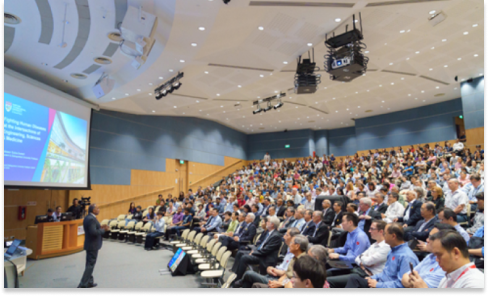Prof Subra Suresh presents inaugural Distinguished University Professor Lecture

Cancer patients today may often get frustrated by the length of time it can take to get a clear diagnosis. In the near future, advances in new technologies will enable faster and more accurate detection, and more effective treatments for these patients.
This was one of the topics raised during an inspiring hour-long lecture by Prof Subra Suresh when he presented his Distinguished University Professor Lecture on Thursday (12 Apr).
Attended by 700 people, the lecture follows from his inauguration as NTU President and conferment as NTU’s first Distinguished University Professor last year.
The NTU Distinguished University Professorship (DUP) represents the highest academic honour that the University bestows on a faculty member. Established in August 2017, this prestigious professorship pays tribute to academic talents with extraordinary scholarly achievement, whose research typically crosses multiple disciplines, and who have distinguished themselves internationally in importance and recognition.

Prof Suresh's notable research in materials science and engineering, mechanics, biomedical engineering, and computational biology, has helped to shape disciplines and technologies at the crossroads of engineering, sciences and medicine.

At his DUP Lecture, Prof Suresh spoke about his research in engineered and biological materials, and their connections to human diseases, in particular cancer, hereditary blood disorders such as sickle cell disease, and malaria.
In one example of his cutting edge work, Prof Suresh and his interdisciplinary research team devised the use of sound waves to isolate rare circulating cancer cells and exosomes in blood that serve as markers for abnormal pregnancy and disorders such as cancer, neurodegenerative disease and kidney disease, among others.
By exposing these cells to sound waves as they flow through a tiny channel, this technique offers a gentler alternative to other cell-sorting technologies, which require tagging the cells with chemicals or exposing them to mechanical or centrifugal forces that may damage or alter their inherent properties.
More importantly, using this portable device known as the Tilted-angle Standing Surface Acoustic Wave that is as small as a person’s thumbnail, it takes less than 25 minutes to process a 100-microliter undiluted blood sample. This potentially offers a more efficient way, compared to current methods, for isolating small vesicles and exosomes in body fluid samples for detecting, monitoring and treating a wide variety of diseases without altering the biological characteristics of such collected samples.
Early detection and monitoring will help improve clinical outcomes using such latest scientific technology, Prof Suresh said.

In another memorable moment from the lecture, Prof Suresh presented a demo of his team’s innovative computer modelling technique that shows how tiny slits in the spleen prevent old, diseased or misshapen red blood cells from re-entering the bloodstream. Members of this multidisciplinary team included specialists in mathematics, supercomputing, clinical medicine, engineering and computational biology.
Leveraging on computer modelling technology provides a new tool for studying the role of cells and organs in human diseases, such as malaria and sickle cell anemia.
It also offers better understanding of how the circulatory bottleneck for red blood cells in the spleen could have an impact on acute and chronic disease states arising from hereditary disorders, human cancers and infectious diseases, with implications for therapeutic interventions and drug efficacy assays.
The Distinguished University Professor, a new highlight in NTU’s annual calendar promises to be a signature platform for an enriching intellectual discourse among our faculty members, the NTU community and the public.







